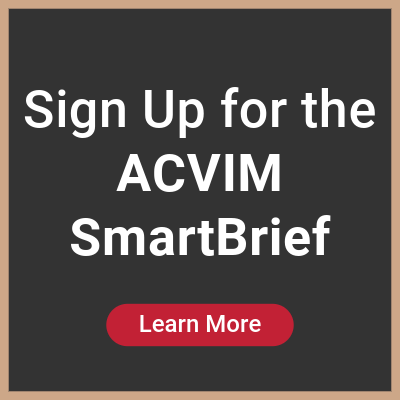Member Spotlight: Jack O'Day, DVM, DACVIM (Oncology)

Jack O'Day, DVM, DACVIM (Oncology) | VCA SouthPaws Veterinary Specialists and Emergency
Jack O'Day is a new Diplomate of the ACVIM, having achieved Board-certification in Oncology in March 2023. He attended the University of Vermont for his undergraduate degree, and received his Doctor of Veterinary Medicine from The Ohio State University in 2018. He completed a small animal rotating internship at the University of Minnesota in 2019, and a medical oncology residency at the same institution in 2022. He currently works as a medical oncologist at VCA SouthPaws Veterinary Specialists and Emergency Center in the Washington D.C. Metro area.
What inspired you to become a Board-certified veterinary specialist?
I was inspired to become a Board-certified veterinary specialist during my time in veterinary school at Ohio State. I came to veterinary school and spent the first few years thinking that I wanted to pursue a career in laboratory animal medicine, but when I took a clinical oncology elective during my second year, I started to wonder if this was the right path for me. Oncology was my second rotation during my clinical year, and I realized that this specialty blended many of the elements that drew me to laboratory animal medicine, but also incorporated a large focus on individual patients. Seeing different ACVIM specialists manage complex cases over the course of my clinical year confirmed my interest in becoming a small animal clinician, and my internship training solidified my goal of becoming a veterinary oncologist.
Is there a story or experience that stands out in your mind that reaffirmed your decision to work in specialty veterinary medicine?
Early in my internship, I was involved in a complex case of a young Labrador with a high grade soft tissue sarcoma. Seeing the collaboration between radiologists, surgeons, and radiation and medical oncologists deliver such a high level of care was one of the experiences that reaffirmed my decision to work in specialty veterinary medicine.
What is something you wish the general public knew about veterinary specialists?
Something I wish the general public knew about veterinary specialists is that companion animals can receive similar care to humans in almost every facet of medicine. For oncology specifically, dogs and cats with cancer have multimodal approaches to treatment, and specialists in medical, radiation and surgical oncology are often collaborating on cases to achieve the best possible long term outcome for our patients.
How is specialty veterinary medicine paving the way for advances in veterinary science?
Even in the short time that I have worked in specialty medicine since starting my residency in 2019, we have seen multiple different products enter the veterinary market that have broadened treatment options and help increase the quality of life of companion animals. For oncology specifically, by studying companion animals with naturally occurring cancer, we are able to leverage our experience with cancer in dogs and cats to impact human health. Many of these advances that we have seen now, and will see in the future, are a result of specialty veterinary medicine.
What do you consider one of your career successes? How did you achieve it?
I would say that the biggest success of my career thus far has been becoming an ACVIM Diplomate. This has been my most tangible career goal since I finished veterinary school, and I was able to achieve it through the support of my colleagues, mentors, family and friends, and the ACVIM.
What do you consider a challenge you’ve faced in your career? How did you overcome it?
Training during COVID. Communication is paramount to being a veterinary specialist, and I learned how to communicate as an oncologist over the phone!
What impact has the ACVIM had in shaping your career?
Since becoming a Diplomate last year, how has your perspective as a veterinarian changed?
Since becoming a Diplomate last year, my perspective as a veterinarian has changed because I have been able to experience the true community of the ACVIM. From reading input on different cases on list- servs, to being able to experiencing continuing education on topics that are particularly pertinent to specialists, my short time thus far as a diplomate has made a more aware clinician in my every day practice.
What advice do you have for those aspiring to become Diplomates?
For those aspiring to become diplomates, my advice would be go get the become exposed to as many different areas of your specialty of interest as possible - never turn down an opportunity to learn from someone who has more experience than you.
..
